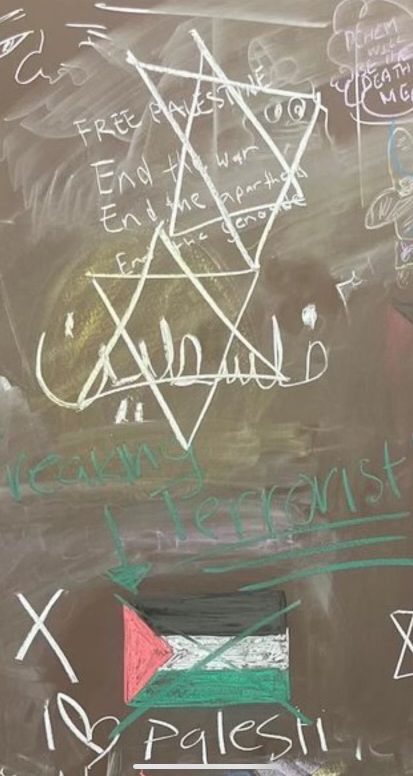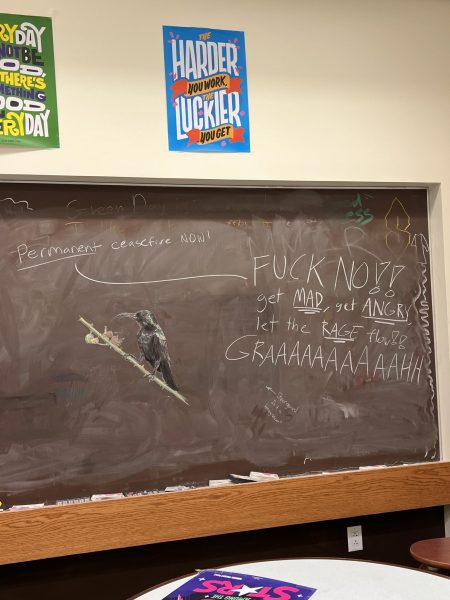Universities are often reflections of the larger world around them from tragedies to triumph. However, when it comes to the Israel-Hamas war, tensions are surmounting on college campuses across the United States. This was seen on John Carroll’s campus when, on Nov. 16, students noticed Islamophobic hate speech written on a chalkboard in the Dolan Center for Science and Technology.
Ever since the beginning of the start of the war in October, campus leaders have focused on fostering a dialogue between Israeli and Palestinian community members. This includes the various clubs on campus such as the Students for Justice in Palestine and Hillel organizations. Additionally, support came from departments such as the Peace, Justice and Human Rights program. From peace walks to panels, many took to advocacy to foster a spirit of peace.
“There was this chalkboard that people draw on all the time,” Gia Hamed ‘25, president of JCU’s chapter of Students for Justice in Palestine, told The Carroll News. “Someone had drew a Palestinian flag and then wrote on it ‘free Palestine.’”
This kind of outreach and interconnectivity only left JCU shocked at the hate speech. According to Hamed, students found the original writing vandalized with the word “you freaking terrorists” as well as the Star of David.

“To me, the Star of David represents a beautiful religion,” Hamed elaborated. “It’s just sad to see it being used or weaponized in that way.”
Following the discovery of the board, an investigation was launched and students were encouraged to report “any hateful or harmful acts” either via JCUPD or through the Bias Incident and Discrimination Reporting Form online.
“We strongly condemn this action,” the email blast read. “It is unacceptable. There is no room for bias, hate or discrimination at John Carroll University. Our Jesuit mission calls us to foster dialogue, understanding and inclusivity.”
Along with this university wide statement, the Tuohy Center for Interreligious Understanding posted a statement online saying “we are deeply disturbed by the recent incident of chalkboard graffiti on campus, which propagates the false notion that Jewish and Palestinian symbols – and thus Jewish and Palestinian people – are somehow inherently oppositional. This is unacceptable and offensive. The attempt to erase the words of our Palestinian and Muslim community members is antithetical to the culture of dialogue and understanding that JCU promises. We recommit ourselves to the work we need to do as a community to ensure that JCU is a place where everyone belongs.”
According to John Carroll Pres. Alan Miciak, the student who drew the Star of David has been identified and is currently going through the dialogue portion of the student conduct process. However, those who wrote the speech itself are still at large with no cameras in the hall to identify the perpetrators. JCU’s Director of Community Standards and Student Wellbeing/Title IX Coordinator Emily Sherwood along with the university’s Director of Diversity, Equity, Inclusion and Belonging J.P. Robinson shined a light on what this conduct process looks like for those who violate anti discrimination policies.
“The Director of DEIB will often meet with students who have been impacted by the incident to check in, learn more about what happened, and give information about next steps,” Sherwood said. “After these meetings, if the incident is referred to the conduct process, the Director of Community Standards and Student Wellbeing will determine what resolution pathway is appropriate. This may range from a meeting with the Director of Community Standards and Student Wellbeing to a University Conduct Board Conference to a University Conduct Board Panel depending on the severity of the concern.”
Sherwood says that the outcomes from these meetings are meant to “repair” and “prevent further harm” as well as create avenues for further dialogue on the issues at hand. However, “disciplinary actions like probation, suspension, or dismissal” are still options.

“I would hope that the message, and having that reinforced by the faculty and the students and so forth, could keep us in a place where we’re continuing to dialogue,” Miciak told The Carroll News. “We may not agree on everything, but it doesn’t mean that we have to be angry or hate each other, because we have a difference of opinion on a very complicated situation.”
Miciak also stressed how important it is to have such strong leaders of cultural organizations on campus who are willing to engage in this dialogue even amidst biases. This includes hosting events like “My First Trip to Israel/Palestine” which Hamed helped host.
“I feel like we are always being so dismissed,” Hamed said. “We have worked so hard to humanize what is happening in the world and it is very exhausting to always have to prove to people that the cause you are fighting for is worth fighting for.”
Those who witness anything that violates JCU’s anti-discrimination policy are encouraged to document the incident via the bias reporting form found here.




